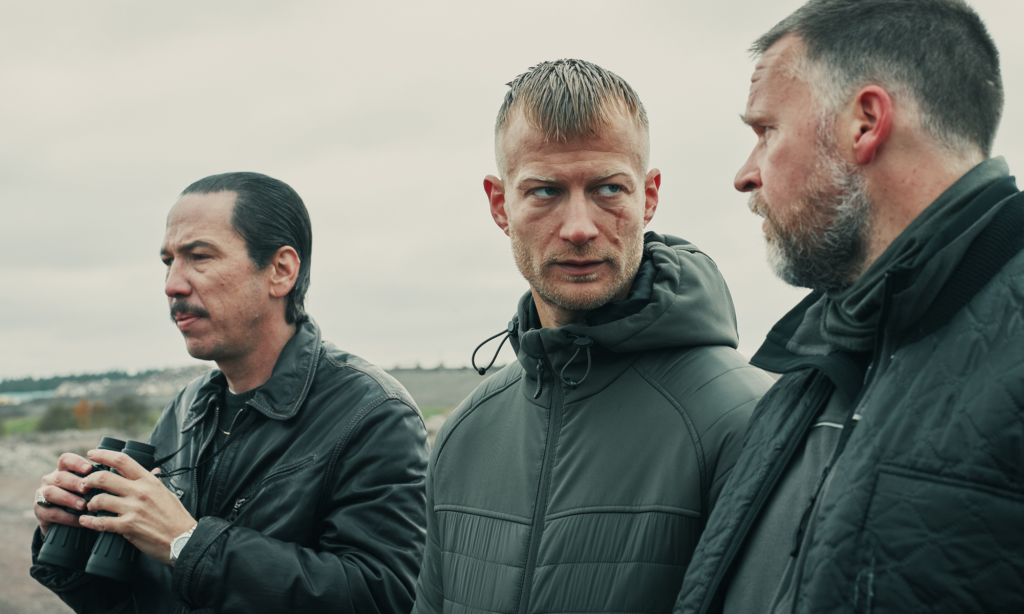Director: Frederik Louis Hviid
Writer: Anders Frithiof August
Stars: Gustav Giese, Reda Kateb, Amanda Collin
Synopsis: In 2008, a group of men from Denmark and across Europe pull off the biggest heist of all time on Danish soil. Kasper, a boxer with few chances left in life, is offered the opportunity to plan the robbery by its foreign initiators.
Many great heist films hinge on something more than just the crime itself. And the thrill of a mega-heist alone obviously draws people in for good reason. But the staying power usually stems from something far more relatable. There’s a human element to many all-timers. Heat is about two diametrically opposed men who share the inability to shed their obsessions and drive in the face of “normalcy.” Inside Man is a panicked look at post-9/11 New York and how it broke down essential factors of daily life. Ambulance is, in many ways, an ode to service workers and veterans alike that are repeatedly served the short end of the stick by the country they call home. The Quiet Ones, celebrating its world premiere at the 2024 Toronto International Film Festival, follows in the footsteps of being a heist movie about something more than just pure greed. Frederik Louis Hviid’s film is based on the true story of Denmark’s biggest robbery in history, which took place in 2008 during the looming economic crisis. Opening with an intense one-take sequence, the film pulls its viewer in quickly, and then almost instantly shifts to the drama that will propel every decision made for the rest of the film. Because if The Quiet Ones makes anything clear, it’s that emotion is inextricably linked with the decisions we make.

A fairly common criticism many throw at films they watch is usually in regards to how certain characters behave in certain situations. Frankly, it’s ridiculous. There are obviously instances wherein a poor script can lead to odd character decisions. But in the case of a well-made and competent film, the answer is simple: it’s necessary for the film to proceed. The character in a slasher film needs to go check out the noise they heard because that’s what the film calls for! And the most interesting element of The Quiet Ones grapples with this very idea time and time again. It’s a film where a large set of characters all make decisions based on their emotions. The reason for this? Because they’re all human. As shown very early in the film, the opening of the film takes place during a robbery where a radio program comments on the impending national worry of a financial collapse. “There’s no cause for concern” is stated verbatim by an official within the banking industry. For those who have some knowledge of financial history, or have merely read the logline of the film, and see what follows in the aftermath of being ambushed, it becomes clear that Hviid is tapping into something potent. Something that throws any sense of rationale out the window: desperation. It’s a powerful feeling that can overcome even the most sensible of individuals, and few can genuinely imagine what that must feel like in the face of possible death or injury. As this genuinely thrilling sequence comes to its climax, the film immediately cuts to a year later where we meet Kasper (Gustav Giese) and his family. They’re at the table eating, and although it’s never stated directly, one gets the sense that things aren’t picture perfect in the household. Unfortunately, this is the first sign of a script that shows where it is a bit underwritten; particularly with regards to how it handles its three major female characters.
On one hand, some may be able to chalk up the refusal to delve into marital tension too deeply as being a sign of confidence. And in certain ways, that’s understandable. There’s more than enough evidence to point out how The Quiet Ones relies on silence and imagery to infer both emotion and thought. This is also a film that is very much about how the internalization of emotion leads to despair and rash decision making. So again, the film doesn’t need to outright depict trouble in the household for the audience to understand why these actions are being taken. The development of both wives in this film are cast aside in favor of their husbands either refusing to open up, or being the victim of physical and emotional abuse by Slimani (Reda Kateb). This issue of the script reveals itself mostly in how little it seems to utilize security guard/aspiring cop Maria (Amanda Collin). At first, she is introduced in a way one might expect to see a parallel journey of sorts. It’s a classic cat-and-mouse set-up! Yet she is missing for large swaths of the movie, only to pop up in the third act in a way that resembles something closer to sequel bait than something emotionally resonant. It makes sense within the context of the film, and is certainly interesting, but if her character were more present, or at least felt, throughout the film, it would make for a more intriguing conclusion. But that’s not to say the third act of this film is underwhelming.
The third act feels stellar for a variety of reasons. There is a lot of planning in this film, and it’s not afraid to take its time (albeit to a fault at times). But upon the arrival of the heist, all hell breaks loose in via stylized direction and Hviid’s thesis statement for the film. Kasper, for the most part, has shown himself to be introspective and confident in his own degree of meticulous planning. But as soon as the first sign of a problem rears its head, something in him snaps. And we begin to see cracks in the armor that were only alluded to prior. He makes rash decisions to prove a point. He refuses to leave money on the floor (literally). At no point in the final act of this film does Kasper make the right decision, save one. And even that is only brought upon by a grave mistake he made. But with that decision Kasper makes, it speaks to his true sense of self, and the point Hviid is trying to make in the first place. Desperation, and the stubbornness that comes with it, isn’t always necessarily a bad thing. It’s completely understandable, and it is felt that Kasper tries to do the right thing despite feeling like every choice he makes goes wrong for him. Perhaps this potentially life-saving choice in question will also go wrong for him. But it nevertheless shows that, when the chips are down, he was doing what he felt was necessary to defuse a situation. Despite all his personal worries and fears leading to a cascading sequence of events that will only bury him someday, it pushes him forward to the point of doing the right thing. Sure, the right thing in this instance might be the lesser of two evils, but for Kasper, it no longer appears that the action is the juice (apologies for invoking Heat twice, but it’s always on the brain!) For Kasper, this desperation pushed him to the point of acknowledging what kind of person he wants to be.

To close out the climax of the film, there’s an absolutely stellar chase sequence. It slams the camera right in the faces of these thieves all packed up in a small car. The audience is left completely disoriented and frightened at what exactly is transpiring aside from hearing shouts and occasional bursts of light. Throughout The Quiet Ones, Hviid shows his ability to command a viewer’s attention through really well-constructed set pieces. At moments where the script feels a bit lacking, the visuals and character dynamics in these sequences make up for it. This is a very serviceable heist film that at the very least attempts to rise to greater heights. It may not always reach them, but as a viewer, the peak is certainly more visible than many heist films that don’t even make the attempt.
The Quiet Ones celebrated its world premiere at the 2024 Toronto International Film Festival.
For more information on the film, head right here.





